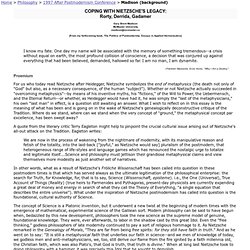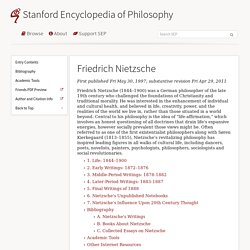

Madison (background) - Coping with Nietzsche's Legacy: Rorty, Derrida, Gadamer. Gary Brent Madison McMaster University madison@mcmaster.ca [From my forthcoming book, The Politics of Postmodernity: Essays in Applied Hermeneutics] I know my fate.

One day my name will be associated with the memory of something tremendous--a crisis without equal on earth, the most profound collision of conscience, a decision that was conjured up against everything that had been believed, demanded, hallowed so far. I am no man, I am dynamite. --Friedrich Nietzsche, Ecce Homo, "Why I Am a Destiny. " Proemium For us who today read Nietzsche after Heidegger, Nietzsche symbolizes the end of metaphysics (the death not only of "God" but also, as a necessary consequence, of the human "subject").
A quote from the literary critic Terry Eagleton might help to pinpoint the crucial cultural issue arising out of Nietzsche's all-out attack on the Tradition. To get a sense of what happens when the Idol comes crashing down, listen for a moment to some of what Baudrillard has to say: Rorty Derrida. The Nietzsche Page at USC. This page is designed to help facilitate the study of the works of Friedrich Nietzsche.

Its primary purpose is to provide scholars an on-line reference for contemporary scholarship about Nietzsche. Scholarship Teaching Biography Bibliography Societies/Orgs. Books On-Line Info Statistics There have been visitors since March 2, 1996. This page is best viewed with Netscape 2.0 Midi support by Crescendo Buy Nietzsche's works online! Looking for something different? Link to Malcolm Brown's or Link to the Journal of Nietzsche Studies. Nietzsche Quotes: Christianity.
Christianity as antiquity.-- When we hear the ancient bells growling on a Sunday morning we ask ourselves: Is it really possible!

This, for a jew, crucified two thousand years ago, who said he was God's son? The proof of such a claim is lacking. Certainly the Christian religion is an antiquity projected into our times from remote prehistory; and the fact that the claim is believed - whereas one is otherwise so strict in examining pretensions - is perhaps the most ancient piece of this heritage. From Nietzsche's Human, all too Human, s.405, R.J. Hollingdale transl. Christianity was from the beginning, essentially and fundamentally, life's nausea and disgust with life, merely concealed behind, masked by, dressed up as, faith in "another" or "better" life. from Nietzsche's The Birth of Tragedy, p.23, Walter Kaufmann transl. Change of Cast. -- As soon as a religion comes to dominate it has as its opponents all those who would have been its first disciples.
Speaking in a parable. Friedrich Nietzsche. 1.

Life: 1844–1900 In the small German village of Röcken bei Lützen, located in a rural farmland area southwest of Leipzig, Friedrich Wilhelm Nietzsche was born at approximately 10:00 a.m. on October 15, 1844. The date coincided with the 49th birthday of the Prussian King, Friedrich Wilhelm IV, after whom Nietzsche was named, and who had been responsible for Nietzsche's father's appointment as Röcken's town minister. Nietzsche's uncle and grandfathers were also Lutheran ministers, and his paternal grandfather, Friedrich August Ludwig Nietzsche (1756–1826), was further distinguished as a Protestant scholar, one of whose books (1796) affirmed the “everlasting survival of Christianity.”
When Nietzsche was nearly 5 years old, his father, Karl Ludwig Nietzsche (1813–1849) died from a brain ailment (July 30, 1849) and the death of Nietzsche's two-year-old brother, Ludwig Joseph, traumatically followed six months later (January 4, 1850). 2. 3. 4. 5. 6. 7.